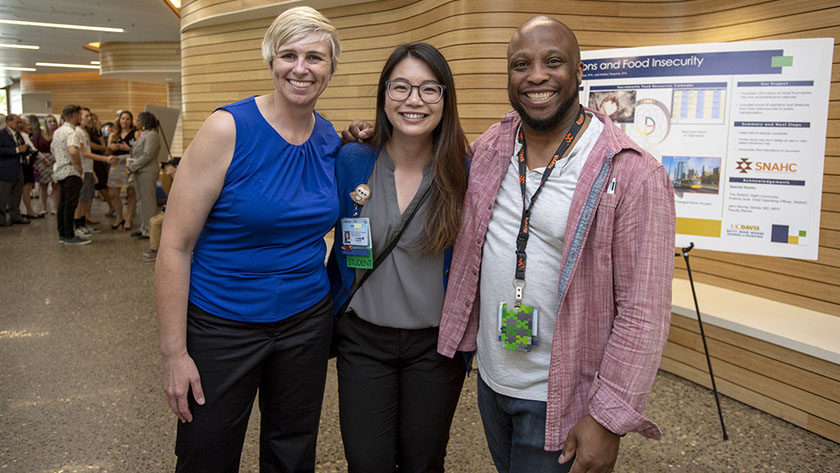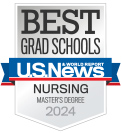Applications are no longer available for the master's-degree leadership program that was offered from 2010 through 2019. Visit our Academics overview page to learn more about current graduate programs at the Betty Irene Moore School of Nursing at UC Davis.
Academics – Master of Science — Leadership Track Degree Program

Master’s-leadership Class of 2019 student Stacy McCarthy enjoys the 2018 Academic Symposium with Master’s Entry Program in Nursing student Lily Tran and doctoral student Khen Russell.
Ideal students for the Nursing Science and Health-Care Leadership Master of Science — Leadership Track are those with experience or interest in transforming health care through nursing education and research. They want to focus on important societal health issues through the work of advancing health and improving the systems that provide health services.
 Graduates of this program are prepared for academic and leadership positions. Graduates exercise leadership through scientific thinking, responsibility, initiative, cultural inclusiveness, knowledge of organizations and system change, teamwork and a commitment to healthy communities.
Graduates of this program are prepared for academic and leadership positions. Graduates exercise leadership through scientific thinking, responsibility, initiative, cultural inclusiveness, knowledge of organizations and system change, teamwork and a commitment to healthy communities.
The M.S. — Leadership Track program is a full-time, professional degree program that prepares graduates for health-care leadership roles in a variety of organizations and as nurse faculty at the community-college level. Some examples include:
- Leaders of health organizations and agencies—such as community clinics, trade associations, advocacy groups—improving quality of care and work environments, and advancing health outcomes and health-care effectiveness and efficiency
- Community college and other prelicensure nursing faculty—teaching the next generation of nurses
- Legislative and governmental agency staff and leadership developing, influencing and implementing policy to improve access and outcomes (not limited to health agencies but other organizations that provide public infrastructure such as transportation, planning or parks and recreation)
- Careers across the health-care sector, such as insurance, pharmaceutical, hospital, home health, aging support services, adoption services, chronic illness support services and medical equipment industries fostering the integration of excellence in clinical care, management, policy, education and research
Sheree Criner, R.N., M.S.—Leadership Class of 2018
Master of Science students take core courses plus electives and must complete a thesis. This is a five-quarter program. Core courses are offered fall, winter and spring quarters (not summer) on the UC Davis Sacramento campus. Students in the master’s-degree leadership program should expect to be on campus at least two days a week. The majority of the program’s core classes are conducted all-day Thursdays and Fridays. Students should expect that some quarters they need to be available on certain weekends and nights. Electives are offered on different days for all students and may be located on either the Sacramento or Davis campus.
A mandatory Leadership Immersion Week serves as an orientation for students. This full-time, three-day experience runs Wednesday through Friday the week before fall quarter begins. Throughout the week, students experience nursing leadership, team building and develop faculty relationships. The coursework provided that week serves as the foundation for the Nursing Science and Health-Care Leadership Graduate program curriculum.
- International graduate requirements
- Full-time enrollment (12 units per quarter) is required
- Required courses for the master’s-degree program include a combination of core courses and electives.
- Students work with their advisers to select electives appropriate to their areas of interest
- A master’s thesis is required
- M.S.—Leadership Track students are expected to complete the program in five quarters
- Master’s-leadership degree requirements
Program goals for the Master of Science — Leadership in Nursing Science and Health-Care Leadership are:
- Apply leadership skills to transform health care.
- Utilize multiple interprofessional and interdisciplinary perspectives to work and communicate as teams.
- Apply nursing science to improve health and reshape health systems through transformative research with an emphasis on aging, rural health and diverse communities.
- Practice cultural inclusiveness in research, practice, leadership and community engagement.
- Create engaged and interactive approaches to nursing education, research and practice using innovative technology.
Expected student aggregate outcomes for the master’s degree
- At least 80 percent of master’s-degree students will graduate on time (within two years).
- Students will be satisfied (average score of 3.5 on a 5-point Likert scale) with their education program as measured by the end-of-program survey.
- 90 percent of graduates will find employment in a health care setting.
- 100 percent of graduates will demonstrate competency through their culminating experience (thesis).
Leadership track: expected student aggregate outcomes
- 50 percent of students report their educational experience had a positive impact on their ability to lead or contribute to education innovation, quality and safety improvement, practice and system change or advancing imaginative partnerships, as measured by the end-of program survey. Example of survey will be available to the Commission of Collegiate Nursing Education (CCNE) reviewers during the site visit.
- 75 percent of students engage in thesis or project work with interdisciplinary faculty.





